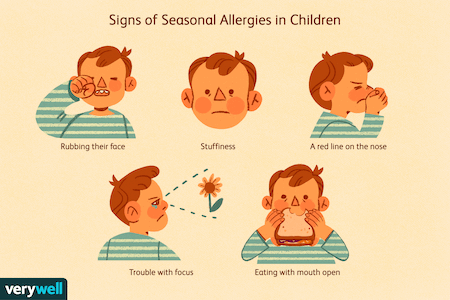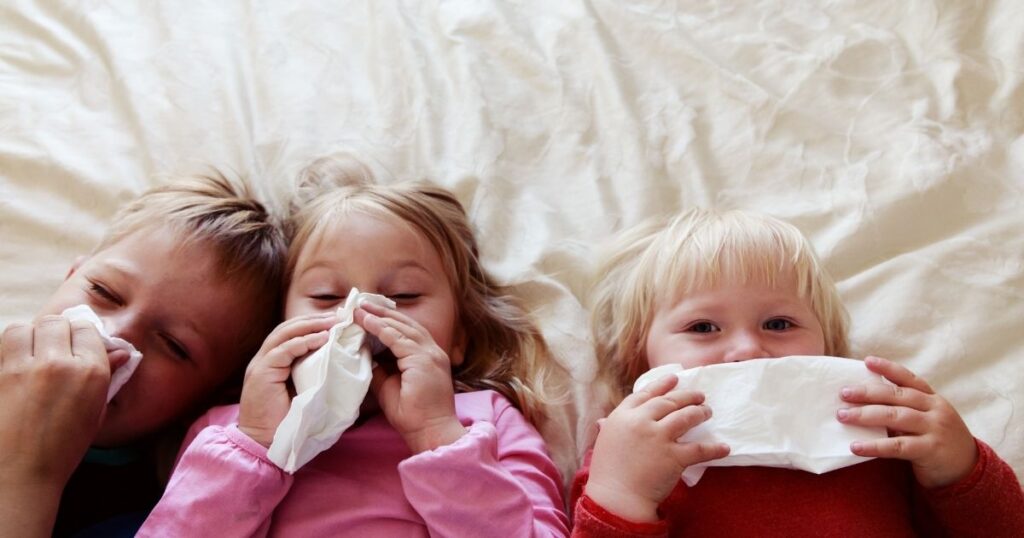While everyone gets excited for this time of year as the temperatures start to rise and the sun starts shining longer, something we don’t look forward to is those brutal seasonal allergies, especially for your children.
Allergies can be tricky for children and can make the process of taking them to daycare or school a little more difficult. In Kenosha and Racine, we experience a lot of pollen from trees, grass, and flowers that can leave you and your little one feeling stuffy, fatigued, and plain gross.
With continued concerns about COVID-19 and other seasonal illnesses, it is important to understand the differences in symptoms and what to do if allergies are confirmed.
Signs & Symptoms of Allergies

Itching, sneezing, and sniffles, oh my! When your child starts to experience “cold-like” symptoms, it might actually be allergies. Allergy symptoms usually come on suddenly and last as long as the allergen is triggering a reaction. Symptoms can include:
- Sneezing
- Runny nose
- Red, watery eyes
- Itchy nose and/or sore throat
- Nasal congestion
- Postnasal drip
These symptoms are common for other illnesses like a common cold, COVID-19, or the flu, so figuring out the root of the issue may depend on further testing. Kids who have coughing, wheezing, or shortness of breath along with these symptoms might have allergies that trigger asthma. If your child is experiencing difficulty breathing, consult a medical professional right away.
So, what do you do? If your child is suffering from allergies, you can’t just keep them out of daycare every day, but at the same time, you want their experience at daycare to be enjoyable and not miserable.
Here are some tips to help children who suffer from allergies:
1) Talk to your doctor
This is an obvious place to start, but it is by far the most important! With so many other illnesses having the same symptoms, it is important to rule out contagious sickness. Speaking to your doctor will allow you to get the most accurate information possible and help identify exactly what your child is allergic to.
They will be able to give you recommendations about medications and maybe even give you prescriptions in extreme circumstances. This will make treatment a lot more effective and have them feeling back to normal in no time!
They will also be able to do a variety of tests (if you are comfortable) to see what the main culprits are. This information may help inform daycare/school staff of allergens and precautions to take so your child doesn’t feel worse.
2) Try to Lessen Triggers
Your healthcare provider or reputable online resources can help you determine how to lessen allergy triggers (if possible). For example, if certain seasons cause symptoms, keep the windows closed, use AC instead of fresh air when possible, and stay indoors when pollen counts are high.
Additionally, using air filters/purifiers in your home can eliminate pollen from the air and clean your home regularly. Using a humidifier can help open up nasal passages by moistening the air in your house while using a dehumidifier in places like a bathroom or basement can reduce the risk of dust and mold allergens.
It also may be beneficial to have your child quickly wash up and change clothes after playing outside. Outdoor allergens like pollen can attach to your clothes and cause further irritation inside.
3) Teach the Importance of Washing Their Hands
Teaching your child the importance of washing their hands can make a huge difference in their symptoms. This is especially important if your child enjoys outdoor activities. You know as well as anyone that a child’s hands touch everything, including surfaces and plants that they might be allergic to.
By having them wash their hands right away, you can prevent pollen from entering sensitive areas like the eyes. This should greatly reduce their symptoms and make them feel much better. This should help decrease the number of symptoms that you see in your kids every day!
4) Make Sure to Tell Your Daycare/School
We can try our best to make some accommodations, especially for those children who suffer from the most severe allergies. By letting us—your daycare or school—know in advance, we can help make smart decisions about outside time and be prepared to help in any way possible!
Remember that allergies, colds, and COVID-19 all have very similar symptoms. If you feel that your child might be sick and not be suffering from allergies, it is better to keep them at home and see your doctor to determine if further testing is necessary.
Allergies are just a tough reality of springtime here in Kenosha and Racine. Hopefully, with these tips, you can have your little ball of energy feeling back to their normal self and ready to have fun at daycare—which is much more fun for us as childcare providers as well!



